Revision of Unit 7 Will people have robots?课件 (共19张PPT)
文档属性
| 名称 | Revision of Unit 7 Will people have robots?课件 (共19张PPT) | 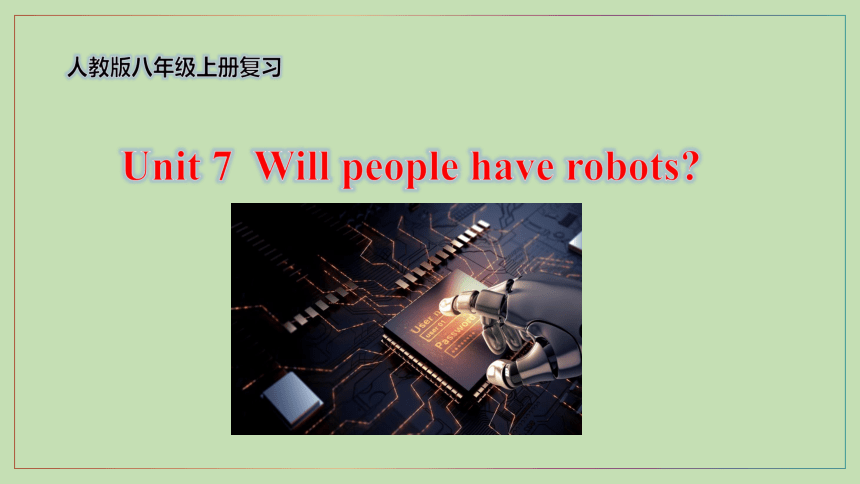 | |
| 格式 | zip | ||
| 文件大小 | 462.4KB | ||
| 资源类型 | 教案 | ||
| 版本资源 | 人教新目标(Go for it)版 | ||
| 科目 | 英语 | ||
| 更新时间 | 2021-12-10 19:34:51 | ||
图片预览


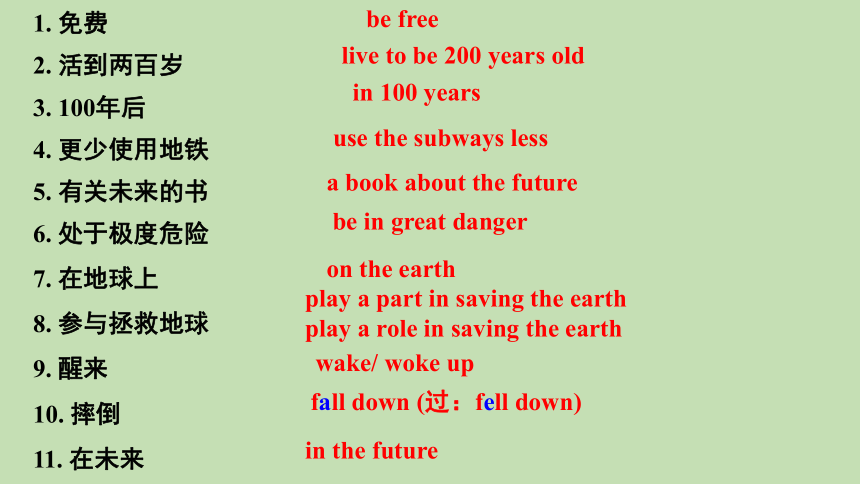
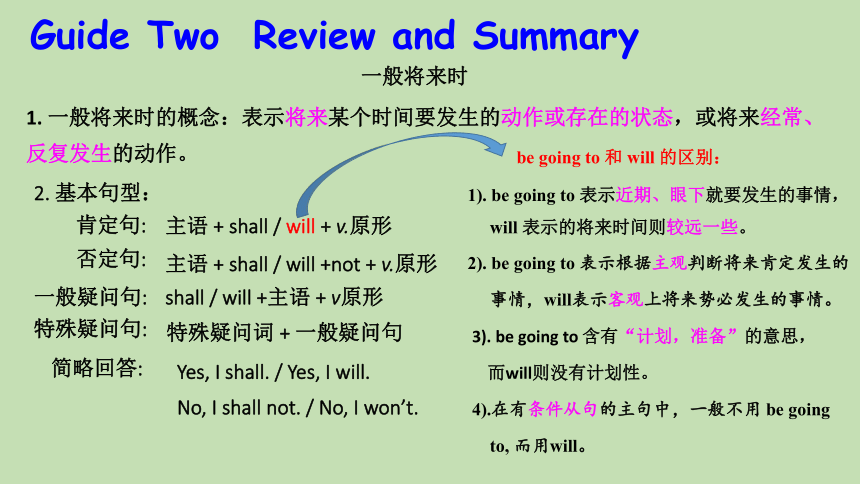
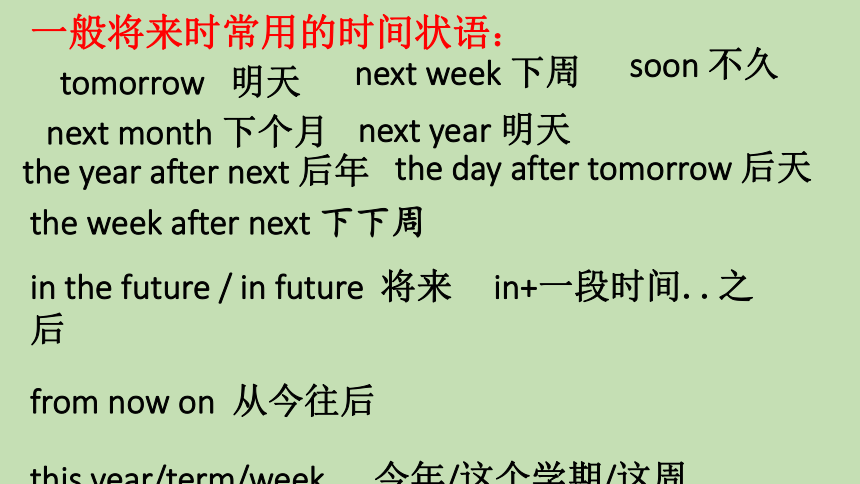
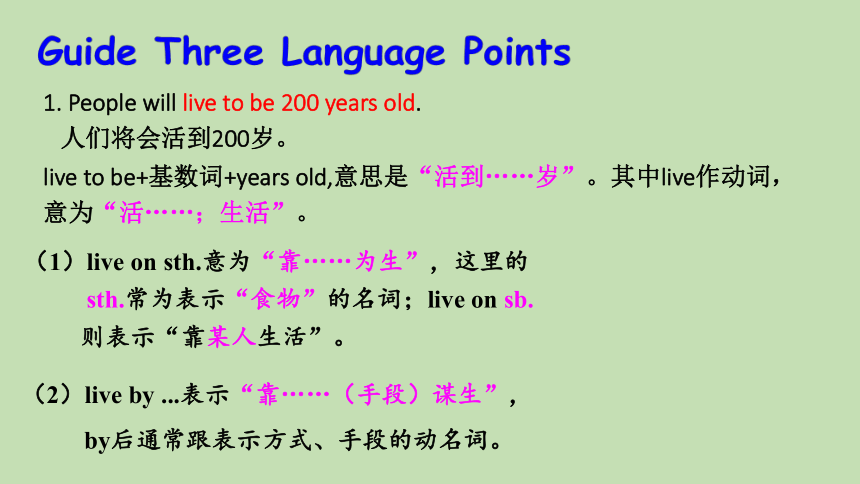
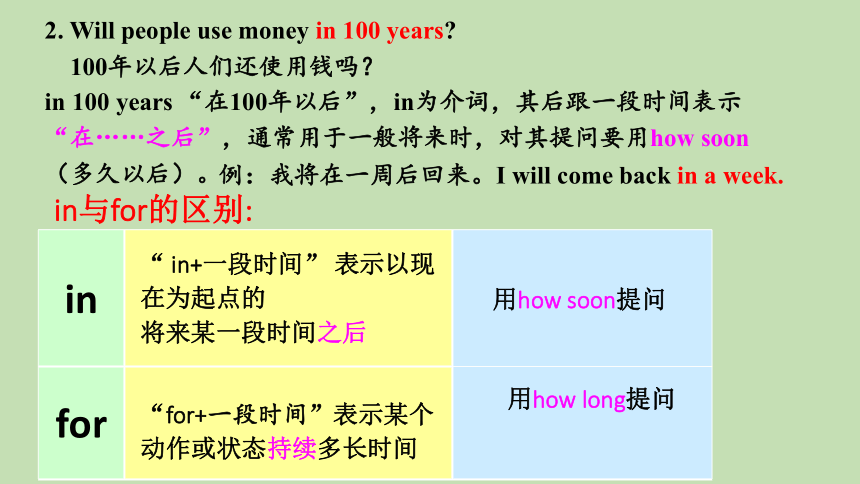
文档简介
(共19张PPT)
Unit 7 Will people have robots
人教版八年级上册复习
Guide One Read and Recite
paper
pollution
future
pollute
environment
Planet
earth
plant
part
peace
sea
build
sky
apartment
space
human
dangerous
already
factory
Japan
believe
disagree
even
agree
shape
fall
inside
possible
impossible
side
probably
during
holiday
word
纸;纸张 (n.)
污染;污染物 (n.)
将来;未来 (n.)
污染 (v.)
环境 (n.)
行星 (n.)
地球;世界 (n.)
种植(v.) 植物 (n.)
部分 (n.)
和平 (n.)
海;海洋 (n.)
建筑;建造 (v.)
天空 (n.)
公寓套房 (n.)
太空;空间 (n.)
人的 (adj.) 人 (n.)
有危险的;不安全的 (adj.)
已经;早已 (adv.)
工厂 (n.)
日本
相信;认为有可能 (v.)
不同意;持不同意见;有分歧 (v.)
甚至;连;愈加 (adv.)
同意;赞成;应允 (v.)
形状;外形 (n.)
倒塌;跌倒;掉落(v.& n.)
(美式)秋天 (n.)
在……里面 (adv.& prep.)
可能的 (adj.)
不可能的 (adj.)
一方(的意见、态度、
立场) (n.)
很可能;大概 (adv.)
在……期间 (prep.)
假期;假日 (n.)
单词;词 (n.)
1. 免费
2. 活到两百岁
3. 100年后
4. 更少使用地铁
5. 有关未来的书
6. 处于极度危险
7. 在地球上
8. 参与拯救地球
9. 醒来
10. 摔倒
11. 在未来
be free
live to be 200 years old
in 100 years
use the subways less
a book about the future
be in great danger
on the earth
play a part in saving the earth
fall down (过:fell down)
in the future
wake/ woke up
play a role in saving the earth
Guide Two Review and Summary
一般将来时
1. 一般将来时的概念:表示将来某个时间要发生的动作或存在的状态,或将来经常、反复发生的动作。
肯定句:
否定句:
一般疑问句:
特殊疑问句:
主语 + shall / will + v.原形
主语 + shall / will +not + v.原形
shall / will +主语 + v原形
特殊疑问词 + 一般疑问句
2. 基本句型:
简略回答:
Yes, I shall. / Yes, I will.
No, I shall not. / No, I won’t.
1). be going to 表示近期、眼下就要发生的事情,
will 表示的将来时间则较远一些。
2). be going to 表示根据主观判断将来肯定发生的
事情,will表示客观上将来势必发生的事情。
3). be going to 含有“计划,准备”的意思,
而will则没有计划性。
4).在有条件从句的主句中,一般不用 be going
to, 而用will。
be going to 和 will 的区别:
tomorrow 明天
the day after tomorrow 后天
next week 下周
next year 明天
next month 下个月
soon 不久
the year after next 后年
一般将来时常用的时间状语:
the week after next 下下周
in the future / in future 将来 in+一段时间..之后
from now on 从今往后
this year/term/week … 今年/这个学期/这周……
1. People will live to be 200 years old.
人们将会活到200岁。
live to be+基数词+years old,意思是“活到……岁”。其中live作动词,意为“活……;生活”。
(1)live on sth.意为“靠……为生”,这里的
sth.常为表示“食物”的名词;live on sb.
则表示“靠某人生活”。
(2)live by ...表示“靠……(手段)谋生”,
by后通常跟表示方式、手段的动名词。
2. Will people use money in 100 years
100年以后人们还使用钱吗?
in 100 years “在100年以后”,in为介词,其后跟一段时间表示“在……之后”,通常用于一般将来时,对其提问要用how soon(多久以后)。
例:我将在一周后回来。I will come back in a week.
in
for
in与for的区别:
“ in+一段时间” 表示以现在为起点的
将来某一段时间之后
用how soon提问
“for+一段时间”表示某个动作或状态持续多长时间
用how long提问
3. There will be (more/less/fewer) people.
将会有(更多/更少/更少的)人。
more是many和much的比较级,“更多的”,既可以修饰可数名词复数,也可以修饰不可数名词。
意思 用法 比较级 最高级
few
little
many
much
一些(否定)
一些(否定)
许多
许多
修饰
可数名词
修饰
不可数名词
修饰
可数名词
修饰
不可数名词
fewest
least
most
most
fewer
less
more
more
意思 用法 比较级 最高级
few
little
many
much
一些(否定)
一些(否定)
许多
许多
修饰
可数名词
修饰
不可数名词
修饰
可数名词
修饰
不可数名词
fewest
least
most
most
fewer
less
more
more
4. in the future与in future
in the future
in future
“在将来,未来”。多指较遥远的将来的某一时间,在时间概念上一般不包括现在。
“从今以后”。相当于from now on; “不久的将来”,相当于in the near future或soon。多指从现在开始近期的将来,在时间上包括现在。
5. They help with the housework and do jobs like
working in dirty or dangerous places.
help with sth. “帮助做某事”,相当于help (to) do sth. 介词with后面接名词或代词。
例:He often helps me with my lessons.
他经常帮我学习功课。
help sb. with sth.=help sb.(to) do sth.
帮助某人做某事
例:你愿意帮我洗碗吗?
Would you like to help me (to) do the dishes
6. Scientists are now trying to make robots look like humans and do the same things as we do.
现在科学家正在尽力制造一些看上去像人类,并能像我们一样做事情的机器人。
try to do sth. “尽力去做某事”,侧重尽力,为了达到目的而努力。也可以说成try one’s best to do sth.。
try doing sth. “尝试做某事”,只是一种尝试, 并没有一定明显的目的性。
例:他试着爬这棵树。
He tried climbing the tree.
例:我正努力学习英语。
I am trying to learn English.=I am trying my best to learn English.
Guide Four Exercises
一、选择合适的单词填空。
1. A place to live in space: _____________
2. Something kids will use to study at home:
___________
3. These will be in every home: _________
4. Yang Liwei is a famous Chinese __________.
space station
astronaut
computers
robots
1. I want to ______ for myself when I’m older.
2. My friends ______ a pet pig in their house.
3. We have to ______ a uniform to school.
4. One day people will _____ to the moon for
vacations.
work
keep
二、用下面的单词填空。
wear
fly
wear work fly keep
三、句型转换。
The students of Class 2 will see the animals at the zoo this Sunday afternoon. (变否定句)
The students of Class 2 ______ ____ the animals at the zoo this Sunday afternoon.
2. The little girl fell off her bike yesterday. (就划线部分提问)
______ ______ the little girl ______ off her bike
3. I think there will be more pollution.(改为否定句)
I ______ think there ______ be more pollution.
4. He will have a good time. (先改为否定句,再改为 一般疑问句)
He ______ ______ a good time. ______ he ______ a good time
5. Mary will get home at nine this evening. (划线部分提问)
_______ _______ Mary get home
won’t see
When did
fall
don’t will
won’t have
Will have
When will
Guide Five Writing
Write a composition about your life in 10 years. You can add more items. (My life in 10 years)
job
home
free time activities
neighborhood
teacher
an apartment in Beijing
keep some plants and pets,
travel around the world
near a park
在英语的书面表达中,经常会出现根据自己的想象描述未来的事物。这类文章往往要求很明确,给出的提示也很具体。介绍未来的事物时,多用一般将来时进行描述,且多用表示 “将来时的时间状语”。
这是一篇表格提示类作文,根据题目要求和提示可用下面的思路导引:
我
的未来
话题引出
具体描述
提出期望
In ten years, I will be …
I will work/travel/live …
I’m sure I will have a/an … life.
In ten years, I will be a teacher. I will live in Beijing because it is a big and beautiful city.
I will work with children and make friends with them. I love children, so I’ll be happy every day.
My life in ten years
I will travel around the world because I like to travel. I don’t like living alone, so I’ll live in an apartment with my best friend. I like keeping pets, so I’ll have many different pets. I’m sure I will have a more wonderful life in ten years.
Thank you!
Unit 7 Will people have robots
人教版八年级上册复习
Guide One Read and Recite
paper
pollution
future
pollute
environment
Planet
earth
plant
part
peace
sea
build
sky
apartment
space
human
dangerous
already
factory
Japan
believe
disagree
even
agree
shape
fall
inside
possible
impossible
side
probably
during
holiday
word
纸;纸张 (n.)
污染;污染物 (n.)
将来;未来 (n.)
污染 (v.)
环境 (n.)
行星 (n.)
地球;世界 (n.)
种植(v.) 植物 (n.)
部分 (n.)
和平 (n.)
海;海洋 (n.)
建筑;建造 (v.)
天空 (n.)
公寓套房 (n.)
太空;空间 (n.)
人的 (adj.) 人 (n.)
有危险的;不安全的 (adj.)
已经;早已 (adv.)
工厂 (n.)
日本
相信;认为有可能 (v.)
不同意;持不同意见;有分歧 (v.)
甚至;连;愈加 (adv.)
同意;赞成;应允 (v.)
形状;外形 (n.)
倒塌;跌倒;掉落(v.& n.)
(美式)秋天 (n.)
在……里面 (adv.& prep.)
可能的 (adj.)
不可能的 (adj.)
一方(的意见、态度、
立场) (n.)
很可能;大概 (adv.)
在……期间 (prep.)
假期;假日 (n.)
单词;词 (n.)
1. 免费
2. 活到两百岁
3. 100年后
4. 更少使用地铁
5. 有关未来的书
6. 处于极度危险
7. 在地球上
8. 参与拯救地球
9. 醒来
10. 摔倒
11. 在未来
be free
live to be 200 years old
in 100 years
use the subways less
a book about the future
be in great danger
on the earth
play a part in saving the earth
fall down (过:fell down)
in the future
wake/ woke up
play a role in saving the earth
Guide Two Review and Summary
一般将来时
1. 一般将来时的概念:表示将来某个时间要发生的动作或存在的状态,或将来经常、反复发生的动作。
肯定句:
否定句:
一般疑问句:
特殊疑问句:
主语 + shall / will + v.原形
主语 + shall / will +not + v.原形
shall / will +主语 + v原形
特殊疑问词 + 一般疑问句
2. 基本句型:
简略回答:
Yes, I shall. / Yes, I will.
No, I shall not. / No, I won’t.
1). be going to 表示近期、眼下就要发生的事情,
will 表示的将来时间则较远一些。
2). be going to 表示根据主观判断将来肯定发生的
事情,will表示客观上将来势必发生的事情。
3). be going to 含有“计划,准备”的意思,
而will则没有计划性。
4).在有条件从句的主句中,一般不用 be going
to, 而用will。
be going to 和 will 的区别:
tomorrow 明天
the day after tomorrow 后天
next week 下周
next year 明天
next month 下个月
soon 不久
the year after next 后年
一般将来时常用的时间状语:
the week after next 下下周
in the future / in future 将来 in+一段时间..之后
from now on 从今往后
this year/term/week … 今年/这个学期/这周……
1. People will live to be 200 years old.
人们将会活到200岁。
live to be+基数词+years old,意思是“活到……岁”。其中live作动词,意为“活……;生活”。
(1)live on sth.意为“靠……为生”,这里的
sth.常为表示“食物”的名词;live on sb.
则表示“靠某人生活”。
(2)live by ...表示“靠……(手段)谋生”,
by后通常跟表示方式、手段的动名词。
2. Will people use money in 100 years
100年以后人们还使用钱吗?
in 100 years “在100年以后”,in为介词,其后跟一段时间表示“在……之后”,通常用于一般将来时,对其提问要用how soon(多久以后)。
例:我将在一周后回来。I will come back in a week.
in
for
in与for的区别:
“ in+一段时间” 表示以现在为起点的
将来某一段时间之后
用how soon提问
“for+一段时间”表示某个动作或状态持续多长时间
用how long提问
3. There will be (more/less/fewer) people.
将会有(更多/更少/更少的)人。
more是many和much的比较级,“更多的”,既可以修饰可数名词复数,也可以修饰不可数名词。
意思 用法 比较级 最高级
few
little
many
much
一些(否定)
一些(否定)
许多
许多
修饰
可数名词
修饰
不可数名词
修饰
可数名词
修饰
不可数名词
fewest
least
most
most
fewer
less
more
more
意思 用法 比较级 最高级
few
little
many
much
一些(否定)
一些(否定)
许多
许多
修饰
可数名词
修饰
不可数名词
修饰
可数名词
修饰
不可数名词
fewest
least
most
most
fewer
less
more
more
4. in the future与in future
in the future
in future
“在将来,未来”。多指较遥远的将来的某一时间,在时间概念上一般不包括现在。
“从今以后”。相当于from now on; “不久的将来”,相当于in the near future或soon。多指从现在开始近期的将来,在时间上包括现在。
5. They help with the housework and do jobs like
working in dirty or dangerous places.
help with sth. “帮助做某事”,相当于help (to) do sth. 介词with后面接名词或代词。
例:He often helps me with my lessons.
他经常帮我学习功课。
help sb. with sth.=help sb.(to) do sth.
帮助某人做某事
例:你愿意帮我洗碗吗?
Would you like to help me (to) do the dishes
6. Scientists are now trying to make robots look like humans and do the same things as we do.
现在科学家正在尽力制造一些看上去像人类,并能像我们一样做事情的机器人。
try to do sth. “尽力去做某事”,侧重尽力,为了达到目的而努力。也可以说成try one’s best to do sth.。
try doing sth. “尝试做某事”,只是一种尝试, 并没有一定明显的目的性。
例:他试着爬这棵树。
He tried climbing the tree.
例:我正努力学习英语。
I am trying to learn English.=I am trying my best to learn English.
Guide Four Exercises
一、选择合适的单词填空。
1. A place to live in space: _____________
2. Something kids will use to study at home:
___________
3. These will be in every home: _________
4. Yang Liwei is a famous Chinese __________.
space station
astronaut
computers
robots
1. I want to ______ for myself when I’m older.
2. My friends ______ a pet pig in their house.
3. We have to ______ a uniform to school.
4. One day people will _____ to the moon for
vacations.
work
keep
二、用下面的单词填空。
wear
fly
wear work fly keep
三、句型转换。
The students of Class 2 will see the animals at the zoo this Sunday afternoon. (变否定句)
The students of Class 2 ______ ____ the animals at the zoo this Sunday afternoon.
2. The little girl fell off her bike yesterday. (就划线部分提问)
______ ______ the little girl ______ off her bike
3. I think there will be more pollution.(改为否定句)
I ______ think there ______ be more pollution.
4. He will have a good time. (先改为否定句,再改为 一般疑问句)
He ______ ______ a good time. ______ he ______ a good time
5. Mary will get home at nine this evening. (划线部分提问)
_______ _______ Mary get home
won’t see
When did
fall
don’t will
won’t have
Will have
When will
Guide Five Writing
Write a composition about your life in 10 years. You can add more items. (My life in 10 years)
job
home
free time activities
neighborhood
teacher
an apartment in Beijing
keep some plants and pets,
travel around the world
near a park
在英语的书面表达中,经常会出现根据自己的想象描述未来的事物。这类文章往往要求很明确,给出的提示也很具体。介绍未来的事物时,多用一般将来时进行描述,且多用表示 “将来时的时间状语”。
这是一篇表格提示类作文,根据题目要求和提示可用下面的思路导引:
我
的未来
话题引出
具体描述
提出期望
In ten years, I will be …
I will work/travel/live …
I’m sure I will have a/an … life.
In ten years, I will be a teacher. I will live in Beijing because it is a big and beautiful city.
I will work with children and make friends with them. I love children, so I’ll be happy every day.
My life in ten years
I will travel around the world because I like to travel. I don’t like living alone, so I’ll live in an apartment with my best friend. I like keeping pets, so I’ll have many different pets. I’m sure I will have a more wonderful life in ten years.
Thank you!
同课章节目录
- Unit 1 Where did you go on vacation?
- Section A
- Section B
- Unit 2 How often do you exercise?
- Section A
- Section B
- Unit 3 I'm more outgoing than my sister.
- Section A
- Section B
- Unit 4 What's the best movie theater?
- Section A
- Section B
- Unit 5 Do you want to watch a game show?
- Section A
- Section B
- Unit 6 I'm going to study computer science.
- Section A
- Section B
- Unit 7 Will people have robots?
- Section A
- Section B
- Unit 8 How do you make a banana milk shake?
- Section A
- Section B
- Unit 9 Can you come to my party?
- Section A
- Section B
- Unit 10 If you go to the party, you'll have a grea
- Section A
- Section B
